
You look around at the passing people, from old women and working mothers to teachers and police, any of them could want you dead. This is the unfortunate reality facing many LGBTQ+ people in Brazil, the world’s most dangerous country for trans and Queer people. With a stark rise in conservatism driving discriminatory legislation and a president that has publicly vilified “gender ideology” and Queer persons, the rights of LGBTQ+ people are threatened by institutions and public support of hateful rhetoric and discriminatory laws.
The political climate fostering LGBTQ+ hate
The current president of Brazil is Jair Bolsonaro, who began his term on January 1, 2019. Bolsonaro is seen as a polarizing figure both within Brazil and by the international community for his disparaging comments against women, people of color, and LGBTQ+ individuals. A far-right figure, Bolsonaro claimed in a 2011 interview with Play Boy that he would rather have a dead son than a gay one.

After the election of Jair Bolsonaro, Brazil’s second openly gay congress member Jean Wyllys left their position and fled the country due to the increased level of violence against LGBTQ+ people and the number of death threats received. “It was not Bolsonaro’s election itself. It was the level of violence that has increased since he was elected,” Wyllys told local newspapers. Bolsonaro has been clear about how his convictions motivate his discriminatory rhetoric that disparages LGBTQ+ people, and his election and widespread public support have also translated to widespread violence.
Bolsonaro represents a rise in conservatism further supported by a significant growth in Evangelism in Brazil over the last decade. Despite being the world’s largest Catholic country, Evangelical churches have been increasing, and now approximately one-third of Brazil’s population is Evangelical. John Otis, a reporter for the National Public Radio, found that “Evangelicals now make up 31% of Brazil’s population, according to the Datafolha polling firm. They’re still outnumbered by Catholics, who make up 51%. But evangelicals are growing at a much faster clip. They’re also more politically active than Catholics.”
Evangelism is an umbrella term for Protestant denominations that emphasize the Bible as the ultimate source of morality and history and a desire to evangelize, or spread their faith. Evangelicals tend to be more conservative and opposed to more progressive values. The concern between the rise in evangelism and subsequent conservatism in Brazil is that these joint forces signal an erosion of secularism and democracy in Brazil.
On his inauguration day, Bolsonaro said, “We will unite people, value the family, respect religions and our Judeo-Christian tradition, combat gender ideology and rescue our values.” On December 1, 2021, the Brazilian senate approved the appointment of Evangelical lawyer and pastor André Mendonça to a position on the Supreme Court. This is a signal of the key role evangelists play in the political climate of Brazil today with positions on the highest court in the nation and executive office.
LGBTQ+ experiences
Foremost, sexuality and gender identities are a focus of discriminatory laws and practices in a lot of states, but trans and Queer people are also the victims of torture, violence, and death.
The highest rates of transpeople and gender non-conforming people killed are concentrated in Central and South America. Most prominently, Brazil has the largest number of trans and Queer people killed in the world, and in 2021, Brazil maintained this position for the 13th consecutive year.
The violence and deaths of LGBTQ+ individuals are in direct contradiction with the right to life and safety guaranteed to all people. Additionally, LGBTQ+ people face more barriers to healthcare access, and discrimination is conflated by additional minority identities such as being a person of color. Trans persons are particularly vulnerable to exposure to violence due to name and sex details in official documents.
As a result of the violence, LGBTQ+ people have been responding by taking defense and martial arts classes. In large cities such as Sao Paulo, Porto Alegre, and Rio, defense courses are being offered to Queer people who increasingly doubt Brazil’s institutions will protect them. Carlos Renan dos Santos Evaldt, a banker and president of a gay sports club in Porto Alegre, was spurred to offer jujitsu classes not just to ensure personal safety, but “rights achieved through hard work and at the cost of many lives and years.”

Since 2014, there has been a growing passage of legislation, approximately 200 bills, at all levels targeting “indoctrination” and “gender ideology.” Bolsonaro’s Minister of Women, Family, and Human Rights, Damares Alves, an evangelical pastor said on her first day, “Girls will be princesses, and boys will be princes. There will be no more ideological indoctrination of children and teenagers in Brazil.”
In 2011, the UN Human Rights Council passed a resolution affirming LGBTQ+ rights as human rights due to the discrimination and violence levied against this minority community. Alves’ promotion of anti-LGBTQ+ speech disparages the identities of all people, and moreover, signals a failure from the ministry with an objective in human rights to combat rhetoric against Queer persons. Brazil is a current member of the Human Rights Council and therefore has an obligation to promote human rights for all.
Brazil requires comprehensive sexuality education (CSE); however, attempts to reduce or eliminate teaching about gender and sexual orientation represent a threat to the right to education, information, and health. These bills represent a process of silencing rather than honoring the diversity of individuals.
Successes in face of growing anti-LGBTQ+ sentiments
While there is still a long way to go in addressing the human rights violations trans and Queer people face in Brazil, there have been successes in the face of growing hate and violence. As previously mentioned, trans people face additional threats due to names and assigned sex at birth listed on official documents. In 2018, Brazil’s Supreme Court ruled that the government could no longer require individuals seeking a name or gender identifier change on official documents to undergo medical procedures or judicial review. Previously, transgender people had to undergo mandatory psychiatric evaluations, medical transitions, or obtain a judicial order. This represents a major step to ensuring the safety and validating the identity of all people. This is a confirmation of the right of a person to self-determination and a denial of any government to decide for a person who they are.
In June 2019, the Supreme Court furthered its protection of LGBTQ+ people by criminalizing homophobia and transphobia. Under the law, homophobia and transphobia would be treated the same way as racism. In May 2020, the Supreme Court struck down a federal ban on blood donations from men who had sexual relations with men.
Also, in 2020, the Supreme Court struck down a number of bills that aimed to censor “gender ideology” and sexuality in CSE programs. These cases established that municipalities could not override national education plans, and in these specific cases, changes represented a violation of the right to equality and education. And in April 2022, the Supreme Court affirmed that the “Maria da Penha” law against domestic violence applied to transgender women.

In spite of political attempts to limit or deny the rights of LGBTQ+ people, there are institutions that still protect these human rights. As of this October, Brazil will hold its presidential election between incumbent Jair Bolsonaro and former president Luiz Inacio Lula da Silva, who is leading in the polls. As Brazilians celebrated Pride month this year with the first in-person parade in two years they did so under the slogan “vote with pride, for policies that represent us.”
The Human Rights Campaign has partnered with Instituto de Políticas Públicas LGBT and Instituto Mais Diversidade in order to promote and develop more inclusive LGBTQ+ employment practices in Brazil and Argentina. By creating more accepting workplaces for Queer people, more inclusion can be fostered across all aspects of life in Brazil.
To get involved, you can support the Human Rights Campaign by donating so these programs can continue to combat discrimination against LGBTQ+ people. Also, by creating dialogues in your own workplaces on LGBTQ+ inclusion, human rights in corporations will continue to be a standard of practice ensuring equality and equity on all levels, local to international.


Published by